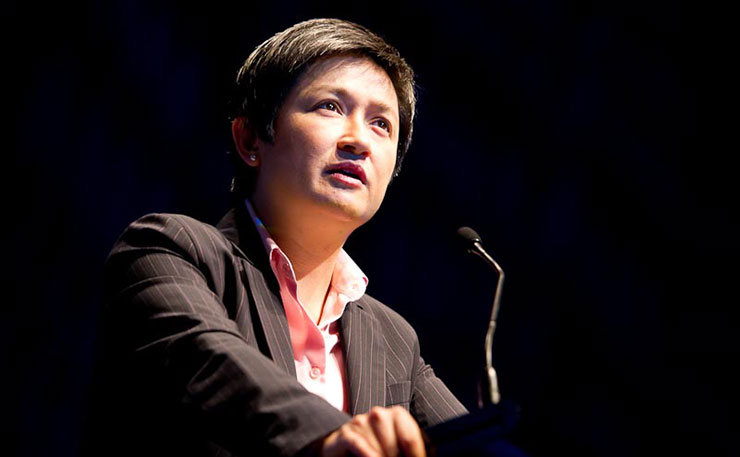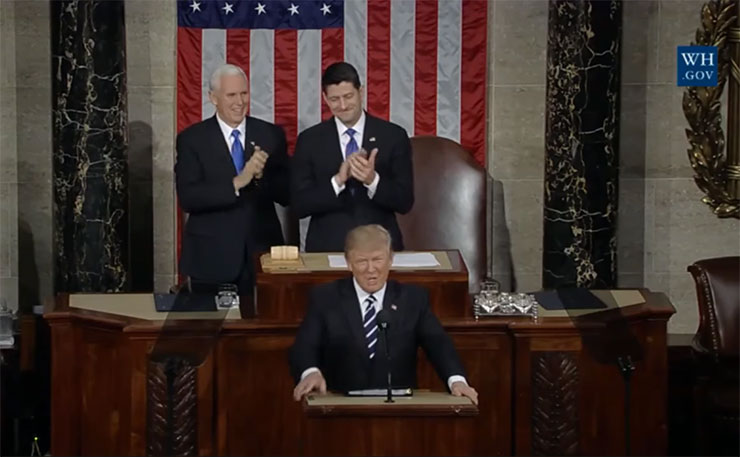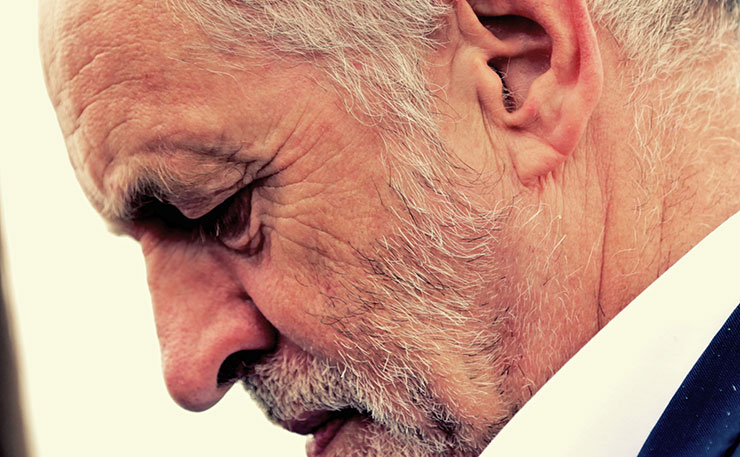When you’re rushing to war or missile strikes or sanctions, demanding calmer heads prevail is akin to treason. Michael Brull explains.
In an extraordinary piece earlier this month in the Sydney Morning Herald, star columnist and centrist-in-chief Peter Hartcher blasted British Labour leader Jeremy Corbyn.
The British government, led by Conservative Prime Minister Theresa May, had blamed the Russian government for the poisoning of two former Russians who had spied for Britain. However, Corbyn “undermined Britain’s response by questioning the basis for the government’s verdict. He gave greater credence to Putin’s denials than to the case mounted by British officialdom”.
In Hartcher’s rendering, “By putting misdirected socialist solidarity above Britain’s national interest, he called down a firestorm of criticism.”
Hartcher contrasted this irresponsible “questioning” of the “basis for the government’s verdict”, with Australian bipartisanship. Here, “Australia’s response has been cohesive and consistent. The Coalition government has been decisive and the Labor opposition fully supportive.”
No pesky opposition “questioning the basis for the government’s verdict”, our patriotic non-opposition deserves credit, from Leader of the Opposition Bill Shorten, to Penny Wong and Tanya Plibersek. Noting that they’re “both drawn from Labor’s left faction”, Hartcher explained that “It’s a tribute to them that both have held to a principled defence of the national interest, neither tempted to play politics on the vital issues nor show Corbyn-esque inclinations to play to outmoded constructs of socialist solidarity. The shadow defence minister, Richard Marles, of Labor’s right faction has been similarly firm.”

Hartcher’s column rested on a few principles. Firstly, that a responsible opposition should not “question the basis for the government’s verdict” on matters of foreign affairs. Mere questioning gives “greater credence” to Russian denials, “than to the case mounted by British officialdom”. Presumably, this is self-evidently damning.
Secondly, because this kind of behaviour is so self-evidently perverse and wrong-headed, Hartcher freely speculated that this treachery, this refusal to “breathe a word of criticism against Russia” must be due to some kind of “outmoded ideological attachment to a long-defunct entity called the Soviet Union.” Corbyn’s decision to put “misdirected socialist solidarity above Britain’s national interest” naturally created a firestorm of criticism.
The third principle follows: those who appropriately believe government claims without question, like the Australian Labor Party, are advancing the national interest, showing leadership, not undermining the government’s unity of purpose, and so on.
All of these principles, in my view, are flagrantly wrong, and simply reflect Hartcher’s traditional subordination to power and authority. Yet the case is particularly revealing, if we look at the relevant facts.
What Corbyn actually said
In a typical BBC interview from March 15, Corbyn said that the “evidence points towards Russia”. He said he asked questions about what happened, because “that’s what oppositions are there for”. He condemned the “appalling attack” in the Commons, but caused outrage by asking questions about the investigation of the chemicals involved in the attack.
In an op ed in the Guardian, Corbyn set out his views at greater length. Beginning by condemning the attack as “horrific”, “barbaric and beyond reckless”, Corbyn said this “demands first of all the most thorough and painstaking criminal investigation, conducted by our police and security services.” Corbyn explained that “the public should also be able to expect calm heads and a measured response from their political leaders. To rush way ahead of the evidence being gathered by the police, in a fevered parliamentary atmosphere, serves neither justice nor our national security.”
He went on to explain that “the Russian authorities must be held to account on the basis of the evidence, and our response must be both decisive and proportionate.” As to the evidence for accusing Russia, Corbyn’s position was as follows:
“Theresa May was right on Monday to identify two possibilities for the source of the attack in Salisbury, given that the nerve agent used has been identified as of original Russian manufacture. Either this was a crime authored by the Russian state; or that state has allowed these deadly toxins to slip out of the control it has an obligation to exercise. If the latter, a connection to Russian mafia-like groups that have been allowed to gain a toehold in Britain cannot be excluded. On Wednesday the prime minister ruled out neither option. Which of these ultimately prove to be the case is a matter for police and security professionals to determine.”

Corbyn went on to support the British government’s expulsion of Russian diplomats. However, calm heads must prevail, and responses should be based on evidence. Corbyn said he has “seen clear thinking in an international crisis overwhelmed by emotion and hasty judgments too many times. Flawed intelligence and dodgy dossiers led to the calamity of the Iraq invasion. There was overwhelming bipartisan support for attacking Libya, but it proved to be wrong. A universal repugnance at the 9/11 attacks led to a war on Afghanistan that continues to this day, while terrorism has spread across the globe.”
It is also worth noting Hartcher claimed that due to “misplaced socialist solidarity”, Corbyn refused to criticise Russia. In fact, Corbyn said “Labour is of course no supporter of the Putin regime, its conservative authoritarianism, abuse of human rights or political and economic corruption. And we pay tribute to Russia’s many campaigners for social justice and human rights, including for LGBT rights.” His position was simply that Britain’s response should not “rush way ahead of the evidence.” As we will see, even Corbyn did so.
The outrage and expulsions
As Hartcher notes, outrage did follow at Corbyn’s outrageous questioning of the government. The firestorm in response from the media did happen. Like Hartcher, they didn’t want the national interest undermined by a sceptical opposition. The British government made claims, and it was obviously offensive to give “greater credence to Putin’s denials than to the case mounted by British officialdom”.
The Foreign Secretary Boris Johnson led the British charge against Russia. Johnson briefed 27 European Union foreign ministers about the poisoning. Calling Russian denials “increasingly absurd”, Johnson complained that the Russian government was trying to “conceal the needle of truth in a haystack of lies and obfuscation” over Novichok, the chemical agent the British government says was used to poison the two members of the Skripal family.

“At one time they say they never made Novichok, at another they say they did make Novichok but all the stocks have been destroyed, and then again they say that they made Novichok and all the stocks have been destroyed but some of them have mysteriously escaped to Sweden, the Czech Republic, Slovakia, the United States, or even the United Kingdom.”
Johnson’s briefings were effective. Over 100 Russian diplomats were expelled from 24 Western governments, including the US, Germany, Ukraine, Canada and Norway. Within a day, this became 140 Russian diplomats expelled. As Hartcher proudly explained, this included Australia. We had bipartisanship, and the senior figures of Labor certainly didn’t express any doubts about Russian culpability.
Whoops
Why were the British government so certain? Because, said the Foreign Secretary, Novichok is a Russian weapon. It couldn’t possibly be anyone else responsible. Porton Downs, Britain’s weapons research facility, tested the poison, and they personally told Johnson that Russia was responsible.

He’s not being misquoted there. There’s video footage of him saying it.
There is no wriggle room here. What Boris Johnson says, on an issue with international ramifications, is not true.
(P.S. it’s not about whether Russia is most likely to have done it, or if other intelligence points to Russia. He names Porton Down.)pic.twitter.com/ayMZbqWeq0
— Alex Nunns (@alexnunns) April 3, 2018
On April 3, a day after Hartcher’s column, the chief executive of Porton Downs, Gary Aitkenhead, had a chat with Sky News. He said, “We were able to identify it as Novichok, to identify it was a military-grade nerve agent. We have not verified the precise source, but we have provided the scientific information to the government, who have then used a number of other sources to piece together the conclusions that they have come to.”
Boris Johnson’s words simply cannot be reconciled with the words of the chief executive of Porton Down.pic.twitter.com/ccHc85lCMX
— Alex Nunns (@alexnunns) April 3, 2018
That is, the Foreign Secretary, who briefed governments around the world about Russia’s culpability for the poisoning, had lied. He said Russia was responsible, because the people at Porton Down were “absolutely categorical… I asked the guy myself… And he said there’s no doubt”.
It should be stressed, it wasn’t just Johnson. British journalist Alex Nunns has shown how the Foreign Office similarly spread Johnson’s claims. They claimed that due to testing by Porton Downs, there was “no doubt” that the Novichok used in the attack was produced by the Russian state.

This doesn’t prove that the Russian government is innocent. It’s possible that they are responsible, and that Johnson is a liar. It’s possible that the British government is blaming Russia, has no good evidence for their position, and also that Russia is to blame. It’s possible that Russia is innocent of this, but the brutal government under Putin has also committed lots of other terrible acts.
What we do know is that the evidence on the public record isn’t conclusive. The conclusions of the British government depend on a “number of other sources” to which the public isn’t privy. Whether or not you believe them depends on how much you trust them. That is, how much you trust the team which has just been caught out lying about the evidence they have.
Most significantly, it turns out Corbyn’s scepticism wasn’t sceptical enough. Corbyn drew conclusions from the purported fact that “the nerve agent used has been identified as of original Russian manufacture”. It turns out, this is not something that the British specialists know. He was naïve in assuming that the British government wouldn’t lie about something like that.
Conclusion
When arguing for calm heads and not rushing way ahead of the evidence, Corbyn cited the debacle of WMDs, used to justify the war on Iraq. He cited similarly dubious intelligence used to justify wars in Afghanistan and Libya.
It turns out, unquestioningly believing the claims of Western governments about what their intelligence agencies have shown them about foreign government’s might not be so great after all. The Trump Administration in weighing up the “Big price” to inflict on the Syrian government for allegedly launching a chemical attack on Syrians in Eastern Ghouta, came to the conclusion that it should send in the missiles.

It is possible that the Syrian government is responsible. It is possible that they are not. Whether or not there are obstacles to Trump launching air-strikes, and risking possible war with Russia, which is backing the Syrian government, depends on whether there are oppositional forces to challenge the claims of Western governments.
In the case of Russia, Corbyn said we need calm heads, to not rush ahead of the evidence, and to conduct thorough and painstaking investigations. All this should sound sensible and reasonable, given the serious risks involved in escalating tensions and possible confrontation with nuclear-armed states. One might think it would be obvious to treat sceptically the claims based on secret evidence of the Western countries that invaded Iraq.
Instead, we have a loyal opposition in Australia. As Hartcher proudly explained, the Australian Labor Party wouldn’t dare “question the basis for the government’s verdict”. From Shorten, to Wong and Plibersek, they all loyally fall into line, believing the “case mounted by British officialdom”. They don’t “play politics on the vital issues”. There’s no questioning, no scepticism, no opposition. As Hartcher says, this is a real tribute to them.
Donate To New Matilda
New Matilda is a small, independent media outlet. We survive through reader contributions, and never losing a lawsuit. If you got something from this article, giving something back helps us to continue speaking truth to power. Every little bit counts.




